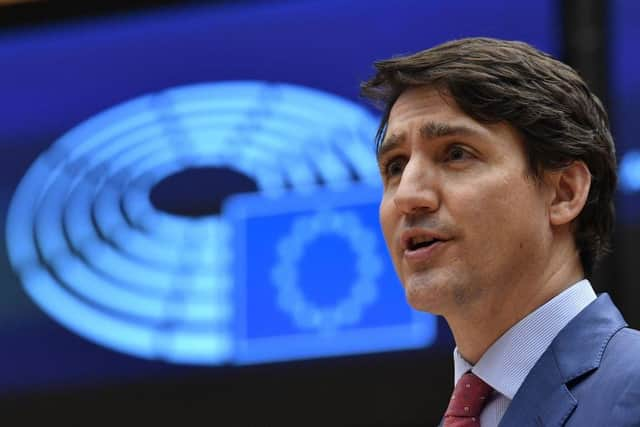Why Canada has reacted to the latest school shooting when the US has not
In a move that will see Canada diversify further from the country with which it shares a 5,500 mile southern border, the country’s prime minister Justin Trudeau has proposed legislation that will see a national freeze on handguns, as well as the removal of firearms licenses of those involved in acts of domestic violence or criminal harassment.
A new “red flag” law will also be created that would enable courts to require individuals considered a danger to themselves or others to surrender their firearms to law enforcement.
Advertisement
Hide AdAdvertisement
Hide AdOn introducing what he described as the “strongest measures in Canadian history”, Mr Trudeau said he wants to keep gun culture out of Canadian communities.


"One Canadian killed by gun violence is one too many,” he said.
As recently as last week, police in the Quebecois city of Montreal dealt with a shooting at the building of a children’s nursery. A window of the Bambino Village daycare facility was smashed by a bullet while the facility was empty during the night. No-one was hurt.
Yet, while undoubtedly an issue, Canada’s gun problem is not at the same level as that of America, where 45,000 people were killed in firearms incidents – both homicide and suicide – in 2020 alone, according to the US Centers for Disease Control and Prevention.
According to gunpolicy.org, a website run by the University of Sydney in Australia, the UK’s gun death rate per 100,000 people is just 0.17, while Canada’s is 1.94. The US, on the other hand, is at 12.09 – a huge difference.
Canada’s gun laws are already more stringent than those of the US. Under existing legislation, all guns must be kept locked and unloaded and anyone wanting to buy a firearm has to undergo extensive background checks.
A ban on hundreds of different kinds of military grade and assault style weapons was brought in in 2020, following Canada’s deadliest mass shooting, when a man disguised as a police officer gunned down 22 people in Nova Scotia. Previous incidents, such as the Montreal Massacre in 1989 – when 14 female students were killed and another ten women and four men injured in the tragic incident at the École Polytechnique de Montréal in Quebec – have also fuelled an anti-gun sentiment in the country.
The latest handgun rules would prevent individuals from bringing newly acquired handguns into Canada and from buying, selling and transferring handguns within the country, essentially keeping the number of handguns in Canada at current levels. Many believe it could pave the way for further legislation in the future, such as an all-out ban on handgun ownership, save for very specific reasons, as was brought in by the UK following the Dunblane school shooting in 1996.
Advertisement
Hide AdAdvertisement
Hide AdHowever, Peter Squires, professor of criminology and public policy at Brighton University, says it is almost impossible to keep firearms out of Canada due to its “porous” border with the US, despite a very different attitude to guns north of the border.
A more accessible healthcare system, seen as key on a global level to tackling mental illness and preventing many mass shootings, is also part of Canadian society. Conversely in the US, many people cannot afford to access even the most basic of medical care.
Prof Squires says: "You've got a gun culture in Canada, no doubt about it. Along with Australia and India, it is one of the old colonial frontier societies where guns were part of the culture, but they didn't have the Civil War and the cowboy culture in the same way [as America].
"There is also the remnants of that welfare ethic, particularly in the French parts, that really do differentiate it from from the States, both culturally and ideologically.”
Prof Squires adds: “But, many of the big Canadian cities have exactly the same sorts of drug, gang and race problems as American cities and there is the problem of the trafficking of firearms over the border. [What Canada is doing now] is taking them on, on all fronts.
"They're trying to restrict the magazine capacity of rifles, tackling the the assault rifle problem, but they're also turning on handguns. [It] is where America seems steadfast not to go.”
The academic says around half of all guns retrieved by the Canadian police originate in the USA – whereas importing guns into countries with no land border, such as the UK or Australia, is far more difficult.
"It’s the bad neighbour problem, really,” he says.
Although the new laws, if passed, will be a huge move for Canada’s gun lobby – the 2020 laws, introduced through regulatory decree rather than a legislative process and enforced through an order in council, sparked legal challenges – they are still a step away from an outright ban.
Advertisement
Hide AdAdvertisement
Hide AdRod Giltaca, the chief executive of Canadian Coalition for Firearm Rights, said he believes the federal government is going too far in its gun control agenda.
"The aspect that gets lost in every conversation especially as it applies to multi-victim public shootings is what is causing this violence ... whether it's a handgun, whether it's a rifle or whether it's a rented van in downtown Toronto," Mr Giltaca told CTV News in Montreal.
Comments
Want to join the conversation? Please or to comment on this article.
